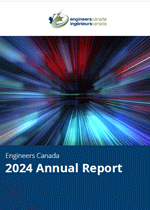Contents
President’s message
Strategic priority 1.1: Investigate and validate the purpose and scope of accreditation
Strategic priority 1.2: Strengthen collaboration and harmonization
Strategic priority 1.3: Support regulation of emerging areas
Strategic priority 2.1: Accelerate 30 by 30
Strategic priority 2.2: Reinforce trust and the value of licensure
Strategic priority 3.1: Uphold our commitment to excellence
Core purpose 1: Accreditation
Core purpose 2: Regulator relationships
Core purpose 3: Services and tools
Core purpose 4: National programs
Core purpose 5: Advocating to the federal government
Core purpose 6: Researching, monitoring and advising
Core purpose 7: International mobility
Core Purpose 8: Promotion and outreach
Core Purpose 9: Equity, diversity and inclusion
Core purpose 10: Protecting official marks
Financial statements
President’s message
We are living in time of rapid change – a key insight that guided the planning of our 2022-2024 strategic plan, A Vision for collaboration, and remains relevant today.
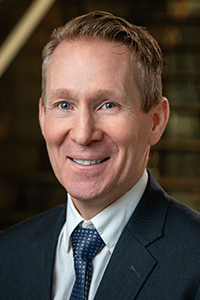
As I reflect on the completion of the plan and the areas of focus that underscored Engineers Canada’s work, I recognize how this evolving landscape shaped our priorities and approach to supporting the profession. This plan was built with some of the major trends and risks in engineering in mind, and I am proud to share progress on our activities with you through this report.
In 2022, Engineers Canada embarked on a three-year journey to conduct a fundamental review of the current accreditation system and explore how it can better serve the engineering profession today and tomorrow. In those three years, the project team gathered a multitude of perspectives from members from the engineering community, investigated practices in engineering accreditation, and worked collectively with regulators and other interest holders to understand if there is a desire to adopt a new national academic requirement for licensure and an updated purpose of accreditation. This work resulted in 120 engagement activities with over 1,300 participants, and six insightful reports published. Among these reports was the final deliverable, the Futures of Engineering Accreditation Path Forward Report, a document outlining the future direction and recommendations to close the gaps between the current and envisioned future state. In 2025, the work to start implementing some of these recommendations will begin.
In this ever-evolving world, equity, diversity, and inclusion is crucial for improving problem solving, fostering innovation, and addressing workforce gaps. Thus, our 30 by 30 journey remained a top priority – an initiative adopted by Engineers Canada in 2014, with the goal of increasing the proportion of newly licensed women engineers to 30 percent by 2030. From 2022-2024, we hosted three 30 by 30 Conferences, one virtual and two in-person. With over 200 attendees at the conferences each year, the national event brought together a diverse audience, sharing their knowledge, stories, and experiences. Observing the evolution of the conference over the years, I am gratified by its growth and how it has become a defining event in the engineering community.
As engineers, we must continue to uphold public safety in an era of rapid innovation and global challenges. Licensure is one of the ways engineering regulators ensure engineers meet and uphold the necessary qualifications and standards needed to protect the public. As part of our Engineers Canada 2024 strategic priority to Reinforce the Trust and Value of Licensure, we launched Pathway to Engineering – a resource that connects engineering students and graduates to information about the licensure process and individuals who can support them along the way. The new hub amassed over 12,000 new visitors and saw the launch of two webinars focussed on information-sharing and community-building. I encourage you to visit the website and follow along the journey for more in 2025.
It is undeniable that there is a real opportunity to expand and enhance the engineering profession. This requires the increased collaboration and harmonization of engineering regulators across Canada. As such, we worked with regulators to identify barriers and opportunities in this area. In 2024, the National Statement of Collaboration and Harmonization was developed and signed by all 12 engineering regulators. This agreement reflects regulators’ renewed commitment to proactively work together to address national and international barriers to mobility for engineers and engineering entities. This work will continue in the next strategic plan.
As I reflect on the last three years, I am pleased by the work we have achieved together. Our collective efforts have strengthened our community and reinforced our commitment to the engineering profession. Looking ahead, we are excited about the next phase of our journey with the new strategic plan, Realizing Tomorrows. This plan will guide us in addressing evolving needs of the engineering community, with a focus on accreditation, truth and reconciliation, equity and inclusion, awareness of engineers, a governance review, and environmental sustainability. We look forward to working with the engineering community to bring this vision to life.
Michael Wrinch, PhD, FEC, P.Eng., ICD.D
President
Strategic priority 1.1: Investigate and validate the purpose and scope of accreditation
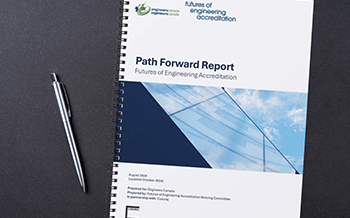
Between 2022 and 2024, Engineers Canada undertook a fundamental review of the accreditation system in a project called the Futures of Engineering Accreditation (FEA). The objective of FEA was to leverage the insights, perspectives, and expertise of members of the Canadian engineering ecosystem to examine the current accreditation system, understand how it’s serving contemporary needs, and consider how it can chart a new path for the future of the profession of engineering. Additionally, the project sought to understand if there is a desire to adopt a new, national academic requirement for licensure applicable to all applicants for licensure.
In 2024, the Academic Requirement Task Force submitted an Academic Requirement Document; a comprehensive overview of the draft concept for the establishment of an academic requirement for licensure that applies to all applicants, regardless whether they studied at a Canadian Engineering Accreditation Board (CEAB)-accredited program or not. In parallel with the academic requirement work, the Purpose Task Force released a Purpose of Accreditation Document, which was a foundational statement about why accreditation exists, what it must achieve, and for whom. Both of these documents contributed to inform the FEA Path Forward Report, a case for change in the accreditation system, generated from many engagement sessions held with numerous interest holders. Recommendations from this Report were shared with the Engineers Canada Board and interest holders in the Fall 2024.
In 2025, Engineers Canada will start implementing some of the recommendations from the Path Forward Report. The Board’s Governance Review Task Force will study the separation of the CEAB’s policy-making functions from operational activities, which was one of the recommendations. The Chief Executive Officer and staff will initiate a Full Spectrum Competency Profile (FSCP) Pilot Study, which was another recommendation. Other work will also be conducted as part of the strategic direction Realizing Accreditation and Academic Assessments (RAAA), as part of the Engineers Canada 2025-2029 Strategic Plan, at the direction of the Engineers Canada Board.
Strategic priority 1.2: Strengthen collaboration and harmonization
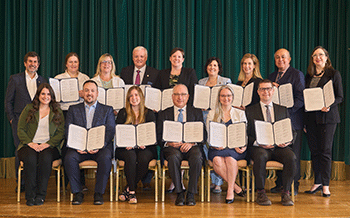
Regulatory collaboration has been part of Engineers Canada’s fabric ever since our beginning. To this day, we act as a conduit for regulators to work together on issues of common interest and we support several collaboration and harmonization initiatives within the regulatory framework (particularly in the areas of admissions, professional practice, and discipline & enforcement).
In 2024, all 12 regulators came together and signed a National Statement of Collaboration, a document that reflects regulators’ renewed commitment to proactively work together to address national and international barriers to mobility for engineers and engineering entities, further advancing public safety and increasing regulatory efficiency.
Finally, as part of the strategic direction “Realizing a stronger federation” in the Engineers Canada 2025-2029 strategic plan, we will formalize a mechanism to select and resource future areas of regulatory collaboration and harmonization. We will also continue our ongoing support to regulator “Officials Groups”, as well as advancing collaboration efforts on items such as continuing professional development (CPD), the Full Spectrum Competency Profile (FSCP) Pilot Study (as part of the strategic direction “Realizing Accreditation and Academic Assessments”), and other areas of shared interest as directed by the CEO Group.
Strategic priority 1.3: Support regulation of emerging areas
As the practice of engineering is evolving, Engineers Canada provides information to help regulators in non-traditional, contemporary, and overlapping areas of engineering practice. We also promote the role of engineers in emerging areas through new and existing National Position Statements and advocacy to the federal government. In 2025, we will publish a research paper on machine learning and data science.
Strategic priority 2.1: Accelerate 30 by 30
In 2014, Engineers Canada’s Board set a target to reach 30 per-cent newly licensed women engineers by 2030. In 2023, female-identifying engineers accounted for 18.7 per cent of newly licensed engineers in Canada. During the same year, female-identifying engineers represented 15.4 per cent of the total number of registrants. More data is available in our annual National Membership Report (NMR). To maintain consistency with the survey language used to create the NMR, we use the term “female-identifying.” This is also due to the varying data collection standards across the country, with some organizations using gender and others using sex data standard.
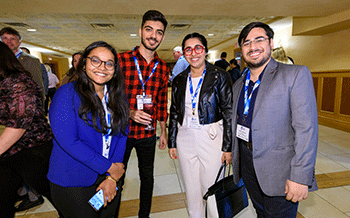
In May 2024, we held a virtual and in-person 30 by 30 conference with the theme “Turning Knowledge into Action for Gender Equity in Engineering” in Winnipeg, Manitoba. The virtual component explored the progress engineering workplaces have made in supporting the different people and positionalities in the engineering profession over the last five years and actions needed to support and make change. The in-person part covered how our work and approaches to achieving gender equity within engineering have evolved, the current state, and what strategies and opportunities we’ll need to adopt if we hope to meet our 2030 target as well as retain newly licensed engineers in the profession, and champion a more diverse, inclusive, and welcoming engineering profession.
This year, in consultation with the regulators, we completed an employer engagement strategy to address the culture change needed in the workplace with a focus on establishing the commitment of employer leaders to diversity, equity and inclusion in the profession. We also published our monthly 30 by 30 newsletter (you can subscribe here). We also commissioned an environmental scan and formative evaluation of the 30 by 30 initiative to better understand the current state and value of the work to date, and to present recommendations for how we can significantly improve the reach and impact of the initiative.
In 2025, as part of strategic direction Realizing an Inclusive Profession, in the 2025-2029 strategic plan, we will be holding an in-person national conference with the theme, “Solutions and Accountability Towards an Inclusive Engineering Profession”. Based on the recommendations from the 2024 formative evaluation and environmental scan, we will be broadening the scope of the work of our 30 by 30 initiative to go beyond women and include other marginalized groups to address the systemic issues hindering our efforts to meet our goal. We are also repositioning the initiative to better mobilize the key influencers around the barriers they control and influence through the creation of complementary goals that will be reflected through the redesign of our champion programs and alignment with our aspirational goal of creating an inclusive profession.
We will continue to serve as a knowledge broker and backbone organization for our network of regulators, higher education institutions and engineering employers and will commission research to support and guide our work. Finally, we will continue to support employers in championing welcoming and inclusive workplaces, launch the Forward Engineering Collective Project, as well as publish our National Membership Report.
Strategic priority 2.2: Reinforce trust and the value of licensure

In 2024 Engineers Canada launched the second year of its Building Tomorrows campaign. Leveraging the success of the first year of the campaign, in 2024 we highlighted some new ways engineers are making an impact such as rethinking communities to make housing more attainable and spotlighting how engineers help protect Canadians from cyberattacks.
Over the two-year campaign, we exceeded overall objectives, doubling our target number of impressions and attracting over 1 million users to the campaign website. The post-campaign survey strongly suggests that we created measurable and significant increases in confidence in engineers, and positive perceptions of the profession. It also expanded understanding of the many impacts engineers contribute beyond buildings and structures.
In particular, almost one-third of respondents (32 per cent) say they may have seen or heard some advertising messages related to engineers in the last year. Of those who do recall at least one element of the campaign, they are more likely to:
- Feel that professional engineers command respect and bring unique skills to the table
- Feel that an engineering license is proof of this
- Believe engineers significantly contribute in each of the areas we asked about
- “Definitely” associate engineers with more diversified impacts like safe electricity, smarter technologies, environmental solutions, accessibility, communications, outer space, medical discoveries, and poverty reduction.
These are substantial results demonstrating that momentum is growing and that the perception of engineers is evolving in the public’s eye. In 2025, as part of the strategic direction Realizing a Fuller Awareness of Engineers, we will, along with regulators, take stock of these successes and decide next steps.
Pathway to Engineering
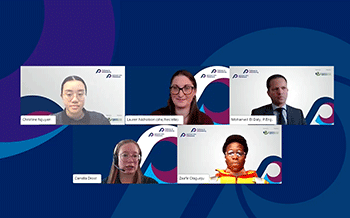
In addition to the marketing campaign, 2024 saw the launch and growth of Pathway to Engineering. Pathway to Engineering is a resource to connect engineering students and graduates to knowledge about the licensure process and create a community of professionals who can support them on their journey. Over the course of the year, we attracted nearly 12,000 visitors to the site and hosted two webinars: “You have your engineering degree... now what?” and “Prepare for the career ahead: regulator programs to help graduates gain licensure.”
The focus in 2025 will be to continue to build traction and improve knowledge sharing. We’ll continue to host the Exchanges webinar series and focus on growing our social media engagement. We’ll also be emphasizing how we can improve knowledge sharing among regulators on licensure and work experience requirements.
Strategic priority 3.1: Uphold our commitment to excellence
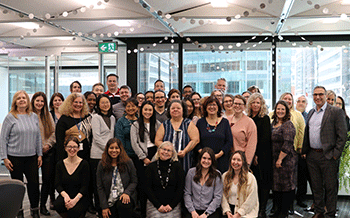
After an eight-year journey through bronze, silver, and gold certifications, Engineers Canada received Excellence Canada’s Platinum certification in 2024. This organizational excellence standard recognizes our organization’s commitment innovation and continual improvement. Engineers Canda has also been recognized as one of the 2024 National Capital Region’s Top Employers. This special designation recognizes employers that lead their industries in offering exceptional places to work. In 2025, we expect to continue working toward sustaining our efforts toward performance and excellence.
Core purpose 1: Accreditation
The Canadian Engineering Accreditation Board (CEAB) accredits undergraduate engineering programs in Canada. Graduates of CEAB-accredited engineering programs meet the academic requirements needed to become licensed by Canada’s engineering regulators. As of the date of publication, there are 307 accredited engineering programs at 45 Higher Education Institutions (HEIs) across Canada.
As part of the 2024/2025 visit cycle, the CEAB visited 97 programs at 21 institutions, involving 154 dedicated volunteers. This was also the first year where Tandem, our new accreditation data management system, was used to support the accreditation process.
In 2024, the CEAB presented a series of recommendations to the Engineers Canada Board on possible interventions that can be made in the accreditation system to support the Engineers Canada 30 by 30 strategic priority.
We also released the 2024 Accountability in Accreditation Report, the result of our annual program evaluation process to measure the effectiveness, trustworthiness, transparency, and efficiency of the accreditation system. The results of this annual evaluation support data-informed decision making about improvements to be made to the accreditation system based on feedback from multi-interest holders.
We have received requests for accreditation from 69 programs at 16 institutions for the 2025/2026 accreditation visit cycle. We will continue to monitor the implementation of Tandem, providing training and support for institutions and for volunteers. We will also consult on potential revisions to the CEAB’s Interpretive Statement on Curriculum Content for Options and Dual-Discipline Programs.
Core purpose 2: Regulator relationships
Engineers Canada brings together all twelve provincial and territorial engineering regulators to share how they regulate within their jurisdictions and solve problems collectively for the benefit of the public. These discussions are key to foster regulatory collaboration and harmonization across Canada, which leads to improved national and international mobility for engineers and their organizations, as well as more effective and efficient processes within each jurisdiction.
We support the admissions, professional practice, discipline and enforcement, communications, finance, and IT Officials Groups under the purview of the CEO Group. The regulator staff in these areas benefit from Engineers Canada support provided through the National Membership Database, the Mobility Register, and the International Institutions and Degrees Database (IIDD), as well as work done on continuing professional development (CPD), Competency-Based Assessment (CBA), time-based experience, and other items. In 2025, we will continue to support these and other projects for the benefit of the Canadian federation.
Core purpose 3: Services and tools

The Canadian Engineering Qualifications Board (CEQB) develops and maintains papers, guidelines, and syllabi that foster consistent engineering practice and qualifications’ assessments across Canada. These documents are developed and are used by regulators’ staff, license holders, and applicants for the benefit of the profession and engineering regulation.
In 2024, the CEQB developed, updated, and released the following documents:
New documents
- Public guideline on duty to report
- Regulator guideline on fitness to practice
Revised documents
- Public guideline on conflict of interest
- Public guideline on the code of ethics
- Regulators guideline on principles for character investigations
- Public guideline on assuming responsibility for the work of engineers-in-training
- Computer engineering syllabus
- Industrial engineering syllabus
- Building engineering syllabus
Looking ahead, in 2025 the CEQB will be working on:
New documents
- Engineers Canada paper on emerging disciplines
- Public guideline on the use of groundbreaking technologies in engineering
Revised documents
- Public guideline on the practice of engineering in Canada
- Regulators guideline on academic assessment of non-CEAB applicants
- Public guideline on Qualified persons in demand-side legislation
- Naval architecture engineering syllabus
- Geological engineering syllabus
- Geomatics engineering syllabus
- Environmental engineering syllabus
- Mining and mineral processing engineering syllabus
In addition to the above, the CEQB has been steadily improving its alignment with Engineers Canada Board policies and guidance, working to maintain regulatory knowledge and relationships, and developing strategies to improve the profession’s engagement with CEQB products.
Core purpose 4: National programs
Professional engineers, geoscientists, their families; as well as participating organizations and their staff have access to a wide range of services tailored exclusively to their needs.
Engineers Canada’s programs and services include the following:
- Insurance plans
- Professional liability and corporate insurance
- Financial services
- Discount programs
The following sections highlight our activities and achievements for 2024.
Insurance plans
Home and auto insurance
Engineers Canada continued to work closely with TD Insurance to provide preferred home and auto insurance rates. 2024 was a historic year for catastrophic losses due to climate change which caused devastating fires, hailstorms, and flash flooding. Additionally, construction, automobile repairs, and auto thefts have dramatically increased raised overall claims costs. To alleviate wait times, caused by the Increase in service calls, TD Insurance onboarded 456 advisors to support the members.
Through rate capping and retention initiatives, there was an 1.7% increase in the number of clients, and a retention rate of 94%, demonstrating the effectiveness of the initiatives as well as the competitive price and service provided.
Term life insurance
For over 75 years, Engineers Canada has partnered with Manulife to provide members with exclusive and industry-leading insurance products. To celebrate the 75th Anniversary of the partnership, a special discount program offered a 75% discount on new and additional term life. The 75th Anniversary program was implemented in April of 2023, and ran until end of March 2024.
To address the rising costs and need to more protection, Engineers Canada implemented a 5% discount on new and additional policies from April 2024 to March 2025. Additionally, a loyalty program provided existing policy holders with a 25% loyalty bonus credit on their next year’s premiums.
Engineers Canada and Manulife continue to collaborate to provide comprehensive and valuable programs with a competitive price. The Term Life program is evaluated annually for competitiveness, through the guidance of an independent external consultant.
Health and dental insurance
There are two plans within the Health and Dental Insurance program:
- Prime Health and Dental plan
- Professional Retiree plan
The Prime Health and Dental Plan is designed for active members whose group insurance is ending, members who want to add to their existing insurance plans as well as those who are self-employed. The Professional Retiree plan offers dental and health insurance plans for retirees to ensure they have continued support.
Last year the rate stabilization initiative ensured that the pricing was incredibly competitive by reducing policy rate increases. Additionally, after a competitive review of the Health and Dental programs, by an independent consultant, it was determined that our policies offered a fulsome program.
Disability income replacement
This program replaces a portion of your income if your become ill or injured and cannot work. The benefit covers a variety of disabilities and has an automatic cost-of-living adjustment and compassionate care supports.
Major accident insurance
Engineers Canada sponsors a Major Accident Protection plan in partnership with Manulife. The plan coverage extends worldwide and can provide the funds to address the immediate costs of an accident.
Critical illness
The Critical Illness plan with Manulife ensures that you are covered upon a diagnosis of an included life-threatening condition. The program provides affordable rates exclusive to Engineers Canada.
Business overhead
This Manulife plan covers eligible business expenses such as rent or mortgage payments, utilities, and employee salaries that when your business revenues slow or stop because of an injury or disability due to an illness or accident.
Pet insurance
Our partner, Petsecure, offers comprehensive pet health insurance plans that covers accident and illness diagnosis, x-rays, hospitalization, surgery, medication, emergency care, and dental care. A 5% discount is available on all plans.
Professional liability and corporate insurances
Professional liability insurance
Engineers Canada endorses Victor Canada as the provider of Professional Liability Insurance, which safeguards the employer, the employees, and the organization from claims and allegations of professional negligence. Victor Canada provides coverage for a wide range of firms including single practitioners to multinational and multidisciplinary firms. Victor is one of the longest standing providers of professional liability insurance in Canada.
As with other programs, the costs associated with resolution of claims have dramatically increased. However, due to the stability of the program and their experience with underwriting and claims the program continues to produce positive results for the insurers.
Secondary professional liability insurance
This is a unique program, through Hub International which is underwritten by AXA XL, legally protects organizations as they perform their professional services. There were no changes to the premiums in 2024, as we are currently in the second year of a three-year rate guarantee.
Corporate insurance
Corporate Insurance includes:
- Directors and Officers (D&O)
- Errors and Omissions (E&O)
- Commercial Crime, and
- Cyber
In 2024, Engineers Canada searched for a Broker for our Corporate Insurance program through a Request for Proposal process. A rigorous review was conducted, and Hub Internation was selected as the Broker of Record. The corporate liability insurance policies were renewed in 2024, with no changes to the premiums.
National Employee Group Benefits Program
Engineers Canada is the plan sponsor for the program through Manulife.
A comprehensive review of the program was conducted in 2024, with an independent consultant, to ensure that the National Employee Group Benefits Program is providing the appropriate coverage. The review focussed on the changing landscape of healthcare, research, and pharmaceutical developments. The review confirmed that the program provides appropriate coverage.
Gender affirmation benefits were added by Manulife to the extended health care plan with no additional premium costs. As well, a review will take place in 2025 of the weight loss drug strategy.
Financial services
Canada Life
Through the partnership with Canada Life, Engineers Canada offers savings plans. The benefit to the member is the reduced fees associated with the plans. The plan includes access to:
- Registered Retirement Savings Plans (RRSP)
- Non-Registered Retirement Savings Plans (NRSP)
- Tax-Free Savings Accounts (TFSA)
- Registered Retirement Income Funds (RRIF)
- Life Income Funds (LIF)
A survey was conducted with 430 active plan participants to gauge the appeal of the current products and services. Overall, the responses were positive, and the respondents were pleased with the choices of investment opportunities.
Manulife One
Manulife One is a flexible account that combines your deposits and borrowing into one account.
Discount programs
VIA Rail
Engineers Canada has partnered with VIA Rail as part of our commitment to sustainability and accessibility. Our members regularly received a 5% reduction in fee for their ticket and up to three additional tickets for those who join them on the trip. This discount can be used by members for business or personal use. A 20% discount was implemented from May 1st to December 31st, 2024, which increased the ridership.
Car rental
Through our partnership with Avis and Budget, members have access to up to 25% off the posted rates.
Shipping
Engineers Canada has partnered with UPS to assist with the transportation of packages and freight. UPS is a global leader with reliable service for shipping and tracking and through this program, a discount of 50% is available for domestic, and international services.
Air Canada
The corporate discount program with Air Canada ended effective December 31, 2024.
Core purpose 5: Advocating to the federal government

Engineers Canada, representing provincial and territorial regulators, seeks to influence the federal government on a variety of topics impacting the engineering profession. We realize this impact through our government submissions, issue statements, National Position Statements, and other opportunities such as testifying before parliamentary and senate committees and participating in government consultations. More information is in our Annual Advocacy Report.
National Position Statements
National Position Statements are engineering regulators’ official stance on a variety of topics. Engineers Canada meets with federal policymakers to influence the outcome of public policy decisions. In 2024, Engineers Canada developed and updated the following documents:
- New National Position Statements on:
- Engineers’ Contributions to Developing and Revising Building Codes
- Engineers’ Contributions to Inclusive Design: Creating Accessible Environments
- Revised National Position Statements on:
- Regulation of Coastal, Ocean and Related Subsurface Engineering
- Artificial Intelligence Engineering Technology in Autonomous and Connected Vehicles
- Labour Mobility in Canada
- The Role of Engineers in Protecting and Advancing the Public Interest (Demand-side legislation)
In 2025, Engineers Canada will review every existing National Position Statement for continued relevance and produce new and updated NPSs in consultation with the regulators based on their needs.
Government submissions
In 2024, Engineers Canada submitted the following government submissions:
- Engineers Canada and Geoscientists Canada in response to the consultation on Policy Notification 48R2
- Submission to the Standing Committee on Human Resources, Skills and Social Development and the Status of Persons with Disabilities
- Submission to the Government of Canada’s Consultation in Advance of the 2026 CUSMA Review
- Submission to Federal Consultations on Building a Modern 21st Century Workforce
- Submission to Federal Consultations on Informing an Industrial Strategy for Homebuilding
- Submission to the Standing Committee on Finance: Pre-Budget Consultations in Advance of Budget 2025
- Engineers Canada’s Comments on the General Review of the Comprehensive and Progressive Agreement for Trans-Pacific Partnership
- Submission to the Standing Committee on International Trade in Advance of the 2026 CUSMA review
- Budget 2024: Highlights and Analysis
- Engineers Canada’s comments on the Housing Design Catalogue
Meetings
In 2024, Engineers Canada participated in eleven meetings with senior government officials to advance our advocacy priorities as laid out in our National Position Statements. We met with senior officials on:
- Federal housing, infrastructure and associated adaptation to a changing climate;
- Federal procurement process and official languages requirements for bidders;
- Energy policy and the importance of demand-side legislation;
- The National Building Code and engineering requirements;
- Gender equality and support for engineering education for marginalized groups;
- The National Adaptation Strategy and the Adaptation Skills Working Group;
- Canada-Indonesia Free Trade Agreement, agreements between Canada and the UK, USA, Ecuador and the European Union; as well as related professional services and regulatory considerations; and,
- Government-funded partnerships to improve credential recognition in targeted sectors and industries.
Core purpose 6: Researching, monitoring and advising
Engineers Canada monitors and shares national and international regulatory trends for engineering regulators. Our regulatory research papers inform their planning and areas of focus in their work. In early 2025, Engineers Canada will be publishing a research paper on machine learning and data science. This research paper was written by Engineers Canada using an established consultation process that involved regulators across the country.
Core purpose 7: International mobility
Engineers Canada represents Canada’s engineering regulators at the World Federation of Engineering Organizations (WFEO) and the International Engineering Alliance (IEA). As a part of the IEA, Canada is signatory to multilateral agreements intended to streamline the licensure process when seeking licensure internationally. To meet its obligation to these agreements, Engineers Canada administers the Engineers Canada Mobility Register, which showcases those individuals that have met the requirements for using the IntPE(Canada) and APEC Engineer designations. Since 2022, a project has been underway to improve the management of this register. The Mobility Register had 798 members at the end of 2024.
In 2024, we conducted a comparative analysis between the Canadian Engineering Accreditation Board’s Graduate Attributes and those of the IEA’s Graduate Attributes & Professional Competencies Framework which will help us develop a roadmap to ensure that our Attributes remain substantially equivalent with other IEA agreement members. This gap analysis was presented to the IEA at their annual meeting held in Delhi, India in June.
Engineers Canada also maintains the International Institutions and Degrees Database (IIDD), a database that provides information to regulators on the different degrees offered internationally. The IIDD was accessed 4390 times during 2024, a three-fold increase since 2023. Finally, through EngineerHere.ca, we share information with international applicants on the Canadian engineering licensure process and on our regulatory system. This information is offered in Arabic, Bengali, Chinese (Traditional), Chinese (Simplified), English, Farsi, French, Hindi, Spanish, Tagalog, and Urdu.
In 2025, Engineers Canada will relaunch an improved Mobility Register as part of our obligation as a signatory to the APEC agreement. The Mobility Register is an important element in Engineers Canada’s commitment to international mobility.
Core Purpose 8: Promotion and outreach
Engineers Canada promotes the engineering profession though its outreach work. The intent of this work is to spark interest in students from kindergarten to grade 12 to develop an interest in engineering and become the next generation of engineers.
Our Explore Engineering website describes our programs for youth, educators, parents, and STEM not-for-profits:
- the Future City Experience, a competition for students in grades 6 to 8, and
- the National Engineering Crest Program, an engineering badge for Girl Guides and Scouts.
These two programs together allow us to reach over 8,000 students in kindergarten to grade 12 annually.
Along with Engineers of Tomorrow, Engineers Canada created the K to 12 Collective Impact Initiative, a network created to prevent duplication of work among organizations aiming to get youth involved in engineering. Member organizations include Let’s Talk Science, BGC Canada (formerly Boys and Girls Club of Canada), Halton District School Board, Ontario Network of Women in Engineering (ONWiE), and Spin Master. In 2024, we launched our third phase which seeks to get parties organized to maximize impact and renamed the initiative the Forward Engineering Collective.
In 2024, Engineers Canada completed its partnership with ChatterHigh to offer Let’s Talk Careers, a biannual competition where high school students can learn more about engineering.
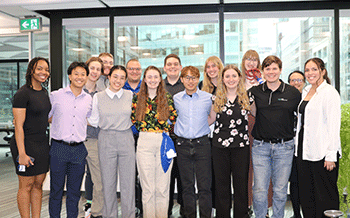
The Canadian Federation of Engineering Students (CFES) is one of our key strategic partners. In 2024, we attended four of their major meetings: the Canadian Engineering Leadership Conference (CELC); the Conference on Diversity in Engineering (CDE); the Conference on Sustainability in Engineering (CSE); and the Canadian Engineering Competition (CEC). We also hosted the CFES’ national leadership team in our office for their annual leadership transition meeting.
National Engineering Month
For over three decades, Engineers Canada has been organizing National Engineering Month (NEM), Canada’s largest celebration of engineering excellence. In 2024, the theme was “There’s a place for you in engineering,” and it celebrated the diversity of thought, opportunities, and people that make up the engineering profession and whose passion and commitment drive tangible efforts that improve our world. NEM received more than 3,996,984 million impressions on social media.
Engineers Canada Awards
Engineers Canada Awards recognize and celebrate the achievements of engineers and engineering students who are advancing the engineering profession and improving the lives of Canadians and others around the world. 2024 recipients were:
- Jonathan Rose, Ph.D., FRSC, P.Eng. - Gold Medal Award
- David Ennis, FEC, FCSSE, P.Eng. - Meritorious Service Award for Professional Service Award
- Karen Webb, P.Eng., MBA, ICD.D - Meritorious Service Award for Community Service
- Gabriel Potvin, PhD, P.Eng. - Medal for Distinction in Engineering Education
- Laleh Behjat, PhD, P.Eng., FCAE, FCSSE - Award for the Support of Women in the Engineering
- Cassandra Pitchford, RHFAC Professional - Gold Medal Student Award
Learn more about our 2024 award recipients.
Fellows of Engineers Canada
In 2024, the following individuals received an Engineers Canada fellowship for their noteworthy service to the engineering profession through their work with either Engineers Canada or the provincial and territorial engineering regulators:
Engineers Canada
Dan Villeneuve, FEC, (Hon.)
Joachim Toelke, FEC, (Hon.)
Association of Professional Engineers and Geoscientists of Alberta (APEGA)
Chandra Acharya, FEC, P.Eng.
Laleh Behjat, FEC, P.Eng.
Joe Bettenson, FEC, P.Eng.
Mohamed El Daly, FEC, P.Eng.
Shannon Hiebert-Allen, FEC, P.Eng.
Gisela Hippolt Squair, FEC (Hon.)
Jeff Krehmer, FEC, P.Eng.
M. Nawaz Panhwer, FEC, P.Eng.
Manon Plante, FEC, P.Eng.
Association of Professional Engineers and Geoscientists of Saskatchewan (APEGS)
Danny M. Baliad, FEC, P.Eng.
Kelvin W. DeGrow, FEC, P.Eng.
Danae N.T. Lemieux, FEC, P.Eng.
Engineers and Geoscientists British Columbia
Mark Adams, FEC, P.Eng.
Mamoud G. Bashi, FEC, P.Eng.
Ariel Berba Estrada, FEC, P.Eng.
Matthew T. Branch, FEC, P.Eng.
Scott William Campbell, FEC, P.Eng.
Grant Connors, FEC (Hon.)
Kelly Jon Dayman, FEC, P.L.Eng.
David Fung, FEC, P.Eng.
Siu Fung Ma, FEC, P.Eng.
Marg Latham, FEC, P.Eng.
Greg Lehoux, FEC, P.Eng.
Jonathan Leung, FEC, P.Eng.
Jianbing Li, FEC, P.Eng.
Martin Lindquist, FEC, P.Eng.
Jim Lowrie, FEC, P.L.Eng.
Michelle Mahovlich, FEC, P.Eng., P.Geo.
Kai Mark, FEC, P.Eng.
Gordon Donald McDonald, FEC, P.Eng.
Felix Menu, FEC, P.Eng.
Phalguni Mukhopadhyaya, FEC, P.Eng.
Lee Peltz, FEC, P.Eng.
Farya Pirbazari, FEC, P.Eng.
Gabriel Potvin, FEC, P.Eng.
Harshan Radhakrishnan, FEC, P.Eng.
Tom Ren, FEC, P.Eng.
Mark Anthony Rigolo, FEC, P.Eng.
Ricardo Rojas, FEC, P.Eng.
Norman Schmidt, FEC, P.Eng.
John Sherstobitoff, FEC, P.Eng.
Malcolm Shield, FEC, P.Eng.
Daphne M. Sidaway-Wolf, FEC, P.Eng.
Scott Sinclair, FEC, P.Eng.
Tim Stanley, FEC, P.Eng.
Efrem Swartz, FEC (Hon.)
Catherine Tatarniuk, FEC, P.Eng.
Caterina Valeo, FEC (Hon.)
Kayla Vantriet, FEC (Hon.)
Peter Wong, FEC, P.Eng.
Gary Yang, FEC, P.Eng.
Engineers and Geoscientists New Brunswick
Dr. Robin Chaplin, FEC, P.Eng.
Jeff Earle, FEC P.Eng.
Kevin Gallant, FEC, P.Eng.
Raphaël Roy, FIC, ing.
Karine Savoie, FIC, ing.
Engineers Geoscientists Manitoba
Vaibhav Banthia, FEC, P.Eng.
Hugo Cea Canas, FEC, P.Eng.
Ethel Fernandez, FEC, P.Eng.
Henry Kuyp, FEC, P.Eng.
Trevor Lytwyn, FEC, P.Eng.
JoAnne Reinsch, FEC (Hon.)
C. Scott Sarna, FEC (Hon.)
Kevin Sim, FEC, P.Eng.
Ronald Sugden, FEC, P.Eng.
Daniel Zubert, FEC, P.Eng.
Engineers PEI
Mark Sherren, FEC, P.Eng.
Ordre des ingénieurs du Québec (OIQ)
Eric Bordeleau, FIC, ing.
David Saint-Jacques, FIC, ing.
Professional Engineers Ontario (PEO)
Michael Bell, FEC, P.Eng.
Patrick Chartrand, FEC, P.Eng.
Jeannette Chau, FEC, P.Eng.
Andrei Cornel, FEC, P.Eng.
James Dawes, FEC, P.Eng.
Danielle Demers, FEC, P.Eng.
Andrew Demeter, FEC, P.Eng.
Cherisse Diaram, FEC, P.Eng.
George Dimitrov, FEC, P.Eng.
Shahandeh Ehtemam, FEC, P.Eng.
Ayman El Ansary, FEC, P.Eng.
Ron Finnigan, FEC, P.Eng.
Ammori Ganem Mohamed, FEC, P.Eng.
Kazi Haque, FEC, P.Eng.
Syed Hashmi, FEC, P.Eng.
Samuel Jacob, FEC, P.ENg.
Aneesh John, FEC, P.Eng.
Peter Keays, FEC, P.Eng.
Javeed Khan, FEC, P.Eng.
Vitali Kovaltchouk, FEC, P.Eng.
Thomas Kurtz, FEC, P.Eng.
Anthony Linton, FEC, P.Eng.
Jennifer Main, FEC, P.Eng.
Mehwish Obaid, FEC, P.Eng.
Marc Pilon, FEC, P.Eng.
Donna Poon, FEC, P.Eng.
Saverio Pota, FEC, P.Eng.
Bozo Radenovic, FEC, P.Eng.
Touraj Rahnamoun, FEC, P.Eng.
Syed Raza, FEC, P.Eng.
Jonathan Rose, FEC, P.Eng.
Rene Siguenza, FEC, P.Eng.
Liu Tai, FEC, P.Eng.
Thayaparan Thangavelautham, FEC, P.Eng.
Karthiga Thevaseelan, FEC, P.Eng.
Gary Thompson, FEC, P.Eng.
Johan Van Der Woerd, FEC, P.Eng.
Joseph Van Meter, FEC, P.Eng.
Emma Vanier, FEC, P.Eng.
Stephen Wall, FEC, P.Eng.
Karen Webb, FEC, P.Eng.
Peng Zhang, FEC, P.Eng.
Engineers Canada Scholarships
Engineers Canada offers three types of scholarships, one for undergraduate students and two for graduate students. The recipients of the 2024 scholarships were:
Engineers Canada-TD Insurance Meloche Monnex Scholarships ($7,500)
- Ivan Au, P.Eng.
- Yena Bassone-Quashie, P.Eng.
- Joahnn Hernando Palacios Rios, ing., M. Sc.
Engineers Canada–Manulife Scholarships ($12,500)
- Amy Do, P.Eng.
- Monica Ho, P.Eng.
- Sarah Rixon-Gunnewiek, MASc., P.Eng
Engineers Canada Leadership Scholarship ($4,000)
- Jolie Gan
- Konrad Jasman
- Brian MacDonald
- Jayden Mackenzie
- Alexis Paredes
- Farah Sadek
- Joyce Xi
- Ruth Yu
Learn more about our 2024 scholarship recipients.
Core Purpose 9: Equity, diversity and inclusion
Engineers Canada continues to be dedicated to improve the proportion of marginalized groups in the profession. We collaborate with our provincial and territorial engineering regulators, engineers, employers, higher education institutions, and engineering students to increase the representation of women, LGBTQ2S+ and Indigenous peoples in engineering. We also publish the National Membership Report, an analysis of trends related to engineering registrants across Canada.
In 2024, Engineers Canada, along with Engineers and Geoscientists British Columbia, continued to offer Equity, Diversity, and Inclusion for Engineers and Geoscientists, a one-hour training webinar for engineering and geoscience professionals of all levels that will introduce them to the topics of equity, diversity, and inclusion in the workplace.
In 2024, we continued working with our Indigenous Advisory Committee to implement our Indigenous Strategy. We also started a new research project, “Truth before Reconciliation”.
Engineers Canada is also part of the Canadian Indigenous Advisory Council (CIAC) to AISES (the American Indian Science and Engineering Society)-Advancing Indigenous People in STEM. AISES in Canada grew from CIAC, created in 2018 out of the identification by AISES and an Engineers Canada working group of the need to have Canadian representation in decision-making to help AISES serve Canadian members more fully. March 2024 saw the signing of Articles of Incorporation for AISES in Canada.
We also collaborate with EngiQueers Canada, Black Engineers of Canada (BEC), and the Canadian Coalition of Women in Engineering, Science, Trades and Technology (CCWESTT). We have a memorandum of understanding with BEC and we have a seat on the CCWESTT Board.
Core purpose 10: Protecting official marks
Engineers Canada is the owner of an official mark for each of the following professional engineering designations:
- ENGINEER
- ENGINEERING
- CONSULTING ENGINEER
- PROFESSIONAL ENGINEER
- P.ENG.
- GÉNIE
- INGÉNIERIE
- INGÉNIEUR CONSEIL
- INGÉNIEUR
- ING.
In 2023-2024 reporting cycle, our caseload included 27 new opposition cases, 8 settlements, 16 abandoned cases, and 0 expunged. We are managing about 45 active oppositions and appeals in the reporting period.
In 2024, Engineers Canada consented to about 47 requests for federal registration, enabling the use of official marks owned by Engineers Canada, in their corporate name.

